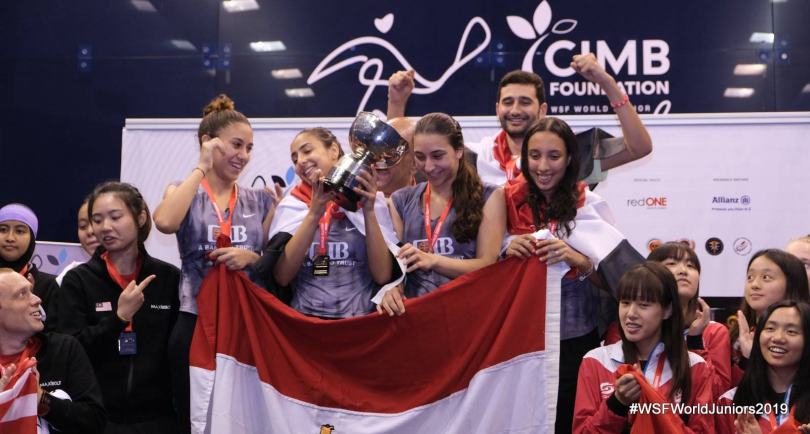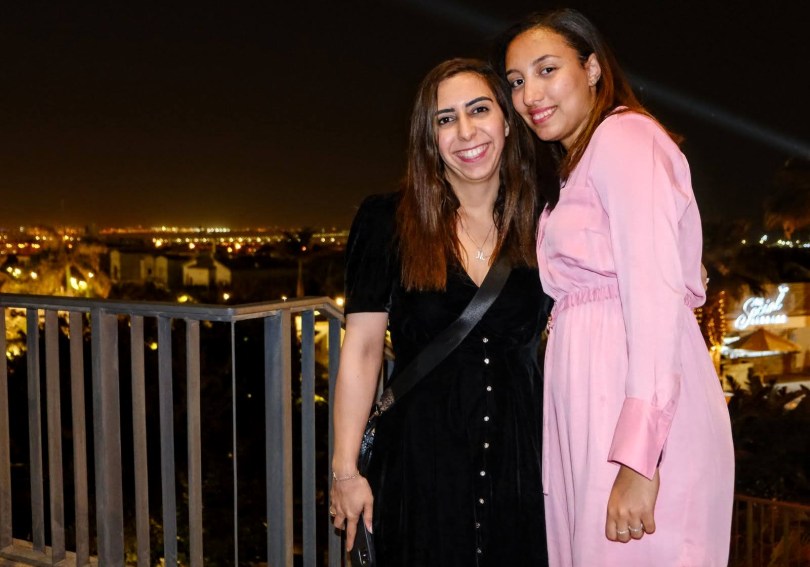If any player on the PSA tour can be said to be burning the candle at both ends, it’s Egyptian rising star Sana Ibrahim.
Talking to Squash Site past 10pm last night following her first round win at El Gouna, the world number 30 admits she has been overworking herself lately.
Having missed six of her end-of-year exams due to her recent trip to the US (where she narrowly lost to Nour El Tayeb at the World Championships and reached the second round of the Richmond Open), the 20-year-old was left playing catch up last week.

“I had four exams in two days,” she said.
“And then at 3pm or 4pm I went to my squash sessions and fitness sessions, and then I had training matches. In these [types of] days it’s hard because I’m not sleeping well, because after I finish all of this I have to study for my next exams.”
On the attack
Such levels of grit and determination are perhaps necessary for someone juggling an Egyptian college education (“in our culture, you have to go to college”) with the global travel and rigorous training demands that come with pro squash.
The highly ambitious former British Open U17 Champion is among a clutch of young Egyptians looking to follow in the footsteps of Raneem El Welily and Nour El Sherbini by becoming World Champion and world number one.

The likeable youngster also plays the same brand of highly attacking squash with which this duo – and Egyptian squash more generally – have become synonymous.
“I like to play in the middle and control with my volleys. My training is to attack anything in the middle of the court, to the back or the front. I like to not just play in the back court; I like to play drops and attack a lot,” she said.
‘I’m so close; I feel so excited’
Having beaten then top 20 player Donna Lobban in the first round of her first Platinum event, Black Ball, in March 2021, Ibrahim admitted it took her some time to find her feet on the senior tour.

But narrow losses against world number 6 El Tayeb and world number 14 Tinne Gillis during her trip to the US earlier this month (match pictured above) have given the Cairo resident fresh belief.
“I was so close to winning the match [against El Tayeb]. She has a lot of experience to help her close the game. When I lost that match I was so sad about it, as I felt I was going to win. I feel so excited because I feel so close.
“This is the last tournament [of the season] and I want to do well,” she said of El Gouna.
“Tomorrow’s a big chance for me,” she added about her game with Yathreb Adel later this afternoon.
“I need to focus on my game because Yathreb is not an easy player at all. If I play a bad shot, she can use it, as her hands are so good for drops and nicks.”
Seeking sponsorship

Having excelled as a junior, Ibrahim does not lack ambition as a senior, with her immediate goals being to break into the top 20 and top 10.
She now trains at the Al Ahly Club in Cairo, one of several big clubs in Egypt alongside the likes of Wadi Degla and Sporting Alexandria (where she played for three years as a junior when her father coached there).
“The big clubs help you with money. Ahly gave me the best offer and we have a good team,” she said, highlighting Mostafa Asal and Nadine Shahin (pictured with Ibrahim, below) among her fellow Egyptian pros that also train there.
The financial support given by these clubs is enough to travel to some of the tournaments, but it isn’t as much as some might assume, Ibrahim added, however.

Competition for attention – and sponsors – among the Egyptian players is fierce, she explained, with only the very top players guaranteed to attract backing from commercial partners. Ibrahim is currently ranked as the 11th best player in Egypt.
“In Egypt, most of the players don’t have a sponsor – it’s just the top players, or because their mother knows this man…,” she said.
“The Federation was calling me every few months and said ‘Sana, we will get a call from the Bank and give you a sponsor’. But every time they said this I would see the sponsorship go to another player. The fifth time I said ‘don’t call me again until you know you really have the sponsor’.
“We don’t know what’s going on with them.”
Coaching conundrum
Egypt may dominate world squash (with 4 of the top 10 women and 5 of the top 10 men hailing from the world’s most populous Arab country), but the sport still lacks national profile and is losing coaches to the US, Ibrahim said.
“In the US, the [players] get more attention than in Egypt. Most of the [Egyptian] coaches are now travelling to the US and if you see a good junior player who’s from the US you’ll see that their coach is Egyptian,” she explained.
“In Egypt, our Federation doesn’t have a lot of money compared with other sports like tennis or soccer.
“We are starting to be famous. Our matches are starting to get on TV, but we still don’t get the same attention as other sports.
“When Nour El Sherbini won her seventh World Championship, she got maybe two or three interviews, and that was it. In tennis, we have an Egyptian player who is starting to get good – if she wins a match [the media] make to her everything if she wins the first round.”

Interviewing El Welily
Ibrahim may one day be in a position to help shift the narrative herself after changing her major at college from Business to Media and Television (she is one year into her four-year college education).
Indeed, in a slightly odd twist to our conversation, Ibrahim revealed that she recently interviewed childhood heroine El Welily (a player who is notoriously press shy, and well beyond the reach of this correspondent). This was to fulfil a brief of interviewing someone famous for one of her exams.

Ibrahim is eager to use these skills after – or even before – she retires, she revealed.
“Of course, I plan to join the tour full-time [after she graduates]. I will focus on squash. I want to reach world number one and be World Champion – that’s my first goal,” she said.
“But my second goal, after I retire, or even [alongside] squash if I have time, is media, because I like it so much.”









